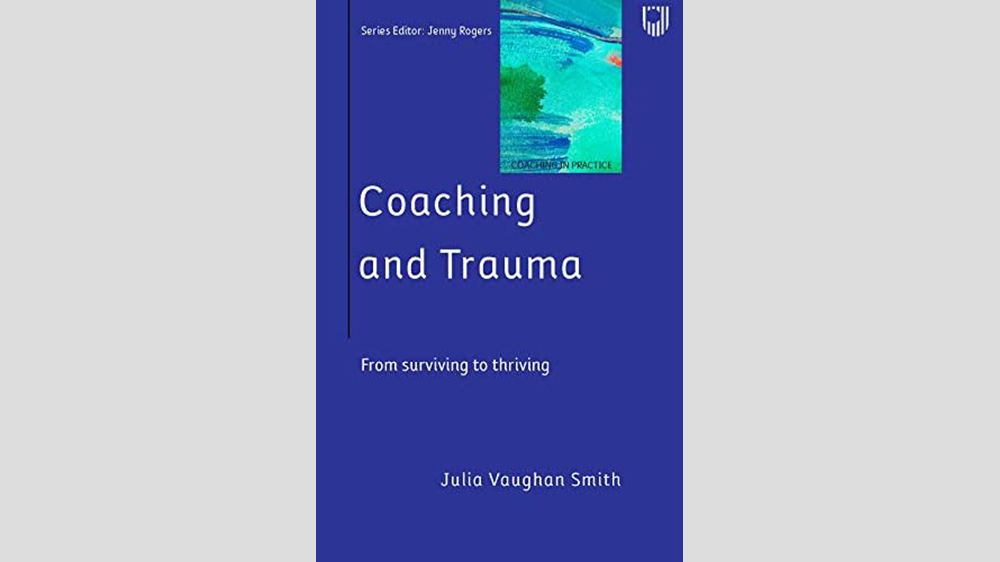
25 January 2023
We recently read Coaching and Trauma by Julia Vaughan Smith, in the EMCC UK Conversations with Authors series. Lucy Whitehall and Lisa Read write below with their thoughts and responses to the book.
‘As a coach working with employees on their wellbeing, I find this book invaluable’
Review by Lucy Whitehall
Coaching and Trauma is required reading for coaches who take trauma seriously in the coaching space. Any coach would benefit from reading this book, but more specifically, those working with common workplace issues such as change, imposter phenomenon, interpersonal conflict at work, overwhelm and long working hours. As a coach working with employees on their wellbeing, I find this book invaluable.
Many coaches are fearful of trauma….and some will spend their whole career not (knowingly) coming across a single case where trauma exists. However, as Julia points out, trauma is more common than we might think, and many of the workplace issues that arise in coaching may stem from a place of trauma. Knowing how to calmly sit with trauma, without fear, can enable clients to make important breakthroughs.
My favourite aspect of this book is the tone that Julia takes. She is compassionate to both coach and client, while being very clear about where the coach can (and perhaps should) go with the client, and what is the territory of therapy.
As we move out of the Covid pandemic and into a period of national and worldwide unrest, for many coaches it can feel like they are dealing with increased numbers of struggling clients. In the western working environment, rates of burnout are at such high rates, with many clients coming to coaches to discover how they can effectively navigate the challenges of doing more with fewer resources, and how they can work in a hybrid world.
In this handbook, the author utilises the work of Franz Rupert to illustrate the prevalence of trauma in society. Straightforward models and explanations are presented throughout the book. For example, Vaughan Smith says that the ‘here and now’ is directly impacted by the ‘there and then’. This is such a rudimentary and yet ground-breaking insight, and so useful to talk through with clients. Keeping the client safe is kept at the heart of this approach.
She says that the survival self is not coachable, and this in itself is really helpful knowledge. I spent many weeks and months in sessions prior to reading this book where I did the client and myself no favours by trying to coach the uncoachable, without recognising that the healthy self needed to be accessed.
I am so much more easeful in the presence of trauma. I’m no longer afraid to sit with a client who is talking about a childhood experience. In the past I always felt this was an area I should avoid. All my training dictated that as a coach, I had no place letting trauma into the coaching space. Neither do I feel I ‘should’ be doing some sort of faux-therapy with the client, which has often led to feelings of inadequacy.
‘I love that it is optimistic about what coaches can do to support people with trauma’
Review by Lisa Read
Coaching and Trauma takes the reader on a journey from understanding what trauma is, to how it presents and the impact it has, and includes models and their application to coaching. The book considers the importance of boundaries and also looks at topics such as leadership and teams. It explains how coaching can have a place in supporting clients with trauma, but that this role is different to that of psychotherapy.
The book is for qualified and practising coaches. I wouldn’t recommend it to brand new coaching trainees, as the book assumes people have coaching knowledge. But more experienced coaches would find it an informative read to further their practice.
I am a coach and a former SENDCo who has had extensive training in understanding and working with trauma, plus training in neuroscience. I still found that while much of the content was a refresher rather than new learning, I enjoyed reading the book and gained some fresh insights.
The book flows really well and it’s obvious that Vaughan Smith has great knowledge and experience that she’s drawing from. For a fairly small book, it’s packed with relevant and useful information. I love that it is optimistic about what coaches can do to support people with trauma. I am a trauma survivor and absolutely know that coaching can help, alongside deeper work to heal trauma wounds.
Coaching and Trauma is an easy to read book that helps coaches to be less ‘frightened’ of working with people who have experienced trauma. As a trauma survivor, I know that folk with trauma are just people. I coach people with trauma day in, day out. None of them are particularly severe, but their trauma definitely impacts on decision-making, presence, confidence and so much more. Understanding trauma is now a must for coaches, and this book is an insightful read that’s a brilliant resource for coaches.